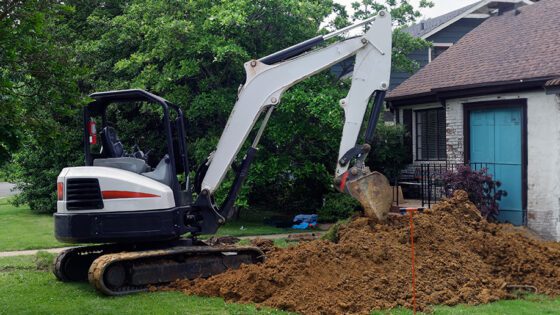Imagine you’re a homeowner and 10 months ago the DOT sent you a letter saying that they were going to buy your house and you had 90 days to move.
But then, they never followed through with the promised purchase. Now, you just received a letter saying that the DOT condemned your property last week and you now need to move within the next 21 days or be evicted.
Fanciful? A recent client of ours thought so too.
The North Carolina Department of Transportation is currently considering revising their procedures for evicting homeowners from their condemned homes. This article highlights our concerns with the DOT’s current eviction procedures (from the homeowner’s perspective). The current procedures have created real and substantial hardships for some of our clients – like the story above.
If you’re being evicted from your home by the NCDOT and you need help, please click here to tell one of our attorneys about your situation.
How the government condemns your property
If you are reading this article, you probably already know that the government has a right called “eminent domain” that allows them to take your property for public use, upon the payment of just compensation.
But how do they do it?
In most cases the government (federal, state, city, county, school system, etc.) becomes the owner of your property by filing a Complaint, Declaration of Taking, Notice of Deposit, and then depositing what they’ve estimated that they owe you with the court in your county. You don’t have to agree to the amount the government deposits.
The idea behind this system is that it allows the government to start work on the project, without being held up by negotiations with the property owner.
 How soon do you have to move (after the DOT condemns your home)?
How soon do you have to move (after the DOT condemns your home)?
Once the government condemns your home or business, you will have to move. Moving is never easy and stress-free, and it is even less so when it is involuntary and rushed.
As of late, the DOT has been making the move even more difficult, and in some cases truly horrific, by giving the homeowner only 30 days to find replacement housing, enter into a purchase agreement, close on the new house, and move.
In 1970, the federal government passed legislation entitled the “Federal Relocation Assistance Act.” It governs land acquisitions by the federal government and all other governments that condemn property utilizing federal funds. (As a practical matter, it applies to almost every condemnation in NC.) In part, the Act creates essentially a “Bill of Rights” for people who are forced to relocate because of condemnation. Displaced homeowners are given the most protection by the Act.
The federal code of regulation, which implements this legislation, can be found at 49 CFR Section 24.204 (A). It states,
No person to be displaced shall be required to move from his or her dwelling unless at least 1 comparable replacement dwelling has been made available to the person. When possible, 3 or more comparable replacement dwellings shall be made available. A comparable replacement dwelling will be considered available to a person if:
- The person is informed of its location;
- The person has sufficient time to negotiate and enter into a purchase agreement or lease for the property; and
- Subject to reasonable safeguards, the person is assured of receiving the relocation assistance and acquisition payment in sufficient time to complete the purchase or lease of the property
As late as 2008, the NCDOT’s policy to uphold this clear and unambiguous language was to give a displaced homeowner at least 90 days to stay in their home after it had been condemned, before the homeowner could be evicted.
The NCDOT’s policy is important because it governs all condemnations in NC – even those overseen by a local municipal authority. In North Carolina, the NCDOT is responsible for implementing the Federal Relocation Assistance Act, in all of their own condemnations and those brought by all other NC agencies.
A change in procedure
Arguably, this is like having the fox guard the henhouse, but historically the NCDOT has made this work. Lately, they have changed the procedures and are doing a poor job in our opinion.
In order to meet their late right-of-way acquisition deadlines and early construction contractual deadlines, the NCDOT has started to give this 90 day notice up to a year before they actually condemn the property – at a point where they know they want to buy your house, but they might not have the money for it quite yet.
Take the case outlined at the beginning of this article. The NCDOT has told you to move, but you don’t have access to the money they’re offering unless you waive your constitutional rights and fold, accepting their settlement offer on their terms.
Essentially, the DOT is telling you to find another house, put it under contract, close, and move – all before they pay you for your current house. Obviously, most people are unable to relocate from their existing home, until they receive the proceeds from the sale of that home. Simply put: most people need their money before they can move.
In the case outlined at the beginning of this article, the DOT would not even pay to move the owner’s personal possessions from their condemned house to a storage unit, until the final move could be completed.
How did this happen?
Several years ago, the NCDOT modified their written procedures to permit the 90 day letter of assurance to be issued before they condemned. As a practical matter, they’ve permitted their right-of-way agents to treat this 90 day letter as a “to-do” item – a box that can simply be checked off, the earlier the better.
Consequently, the 90 day letter has become meaningless in North Carolina.
The NC Department of Transportation is reviewing these policies now. We, on behalf of our clients who have found themselves in this untenable situation, would encourage the NCDOT to revert to their prior policy of only sending 90 day letters to property owners when the DOT actually condemns.
This policy would most closely conform to federal law. But most importantly, it’s the only policy where the condemned homeowner is treated like we would want to be treated, if we found ourselves in the same situation.
NC land condemnation & eviction lawyers
If your property is being condemned by the NCDOT or another governmental agency, it’s probably in your best interests to at least speak with an experienced eminent domain attorney before taking any action that could affect your rights.
Our eminent domain attorneys have been handling condemnation cases for over 100+ years, combined. We understand what you’re going through – and what you’re up against. Click here to get a free, no-obligation case evaluation.



